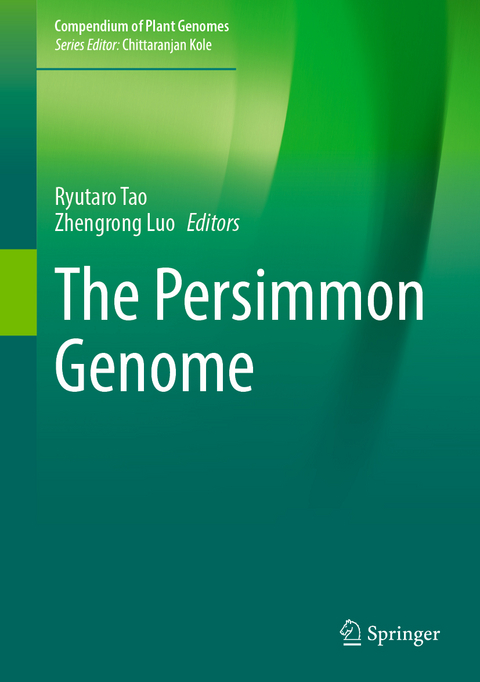
The Persimmon Genome
Springer International Publishing (Verlag)
978-3-031-05583-6 (ISBN)
This book will expound the latest information on the current state of persimmon genomics and transcriptomics, with a particular focus on the latest findings and analysis in relation to the most important agronomic traits. The genus Diospyros contains about 400 species distributed all continents of the globe. Most of Diospyros species are distributed in the tropical and subtropical regions, while cultivated persimmon or simply kaki (Diospyros kaki) originates in East Asia and has been grown in China, Japan and Korea for many years. World production of persimmon has been increasing continuously since 1990s, with China being the most producer. Outside Asia, kaki production has been rapidly increasing in Spain in recent years. Because kaki is mostly hexaploid (2n = 6x =90) and its genome size is quite large with the flow cytometric analysis estimation of about 900 Mb, genetic and molecular studies in persimmon are quite complicated. Diploid close relatives of kaki,D. lotus and D. oleifera have been recently used as model species of kaki. Utilizing these species, molecular basis of several economically molecular basis of important traits such as sexuality and astringency has been studied, giving important information for kaki breeding.
Prof. Ryutaro Tao is a molecular geneticist in the area of fruit tree science. He has been a professor of Kyoto University since 1988. Prof. Tao's research career was started when he started his graduation thesis study on the development of tissue and cell culture system for persimmon (Diospyros kaki) in 1983 at Kyoto University. Since then, he has been working on persimmons. He has been also working on the reproduction biology of fruit tree species in Diospyros and the Rosaceae, utilizing molecular, genetic, and genomic techniques. He has been extensively working on the sexual system in Diospyros and Actinidia for the last 10 years. Prof. Zhengrong Luo is a pomology scientist, especially working on persimmon physiology, genetics and breeding. He has been a professor of Huazhong Agricultural University since 1996. Luo's initial research career was on citrus environment tolerance from 1982 to 1992 of his graduate thesis and early profession. Since 1993, he has been working on origin, evolution, molecular breeding and molecular biology in persimmon for more than 25 years.
Chapter 1. History and Current Status of Worldwide Production.- Chapter 2. Origin, Evolution, Taxonomy, and Germplasm.- Chapter 3. Scion Cultivar Breeding.- Chapter 4. Rootstock Breeding and Propagation.- Chapter 5. D. lotus Genome.- Chapter 6. D. oleifera Genome.- Chapter 7. Chloroplast Genome of Diospyros Species.- Chapter 8. Sexual System and Its Evolution.- Chapter 9. Sex Expression in Chinese Persimmons.- Chapter 10. Chinese PCNA.- Chapter 11. Japanese PCNA.- Chapter 12. Fruit Size Control.- Chapter 13. Transcriptomics During Artificial Deastringency Treatment.
| Erscheinungsdatum | 04.09.2022 |
|---|---|
| Reihe/Serie | Compendium of Plant Genomes |
| Zusatzinfo | XVII, 176 p. 91 illus., 71 illus. in color. |
| Verlagsort | Cham |
| Sprache | englisch |
| Maße | 178 x 254 mm |
| Gewicht | 528 g |
| Themenwelt | Naturwissenschaften ► Biologie ► Botanik |
| Naturwissenschaften ► Biologie ► Genetik / Molekularbiologie | |
| Technik ► Umwelttechnik / Biotechnologie | |
| Schlagworte | Persimmon Gene Annotation • Persimmon Genome • Persimmon Genome Database • Persimmon Important Traits • Persimmon Transcriptomics |
| ISBN-10 | 3-031-05583-7 / 3031055837 |
| ISBN-13 | 978-3-031-05583-6 / 9783031055836 |
| Zustand | Neuware |
| Informationen gemäß Produktsicherheitsverordnung (GPSR) | |
| Haben Sie eine Frage zum Produkt? |
aus dem Bereich


